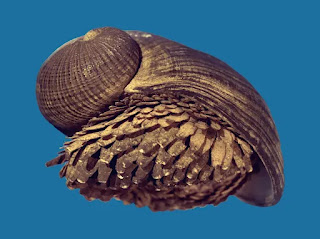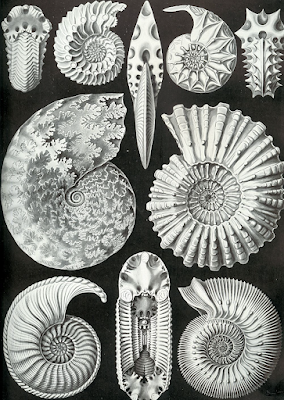Walking in a quiet cemetery in a scenic valley in search of a poet's gravestone. Silence, tranquility, the peace of souls in repose. In the midst of a road trip, I'd made a quick stop in Bethlehem, Pennsylvania on a summer afternoon to pay a visit to the grave of the poet H.D. aka Hilda Doolittle (Sept 10, 1886 - Sept 27, 1961), located in Nisky Hill cemetery, on East Church Street. The same street where H.D. was born and spent her childhood.
Three months prior, back in April, I was in Asia walking along the beach on a small tropical island in the Philippines where a thick blanket of humid heat smothered the air and the lines of H.D.'s poem "Heat" became a repeated mantra:
O wind, rend open the heat,
cut apart the heat,
rend it to tatters.Fruit cannot drop
through this thick air—
fruit cannot fall into heat
that presses up and blunts
the points of pears
and rounds the grapes.Cut the heat—
plough through it,
turning it on either side
of your path.
A poem like this one is an object of contemplation, an artifact to be carried around, consulted, unpacked and admired. H.D. wrote many of these perfect gems. H.D. was the premier poet of the style her lifelong friend Ezra Pound had called Imagism or Vorticism, for the concentration of compacted representation into a vortex of words. Efficient, concise, unencumbered expression carved into verse as if chiseled into stone. As Pound described it in his Vorticism declaration, "It is the picture that means a hundred poems, the music that means a hundred pictures, the most highly energized statement, the statement that has not yet SPENT itself in expression, but which is the most capable of expressing." The point of the Image, in Pound's view, was not simply to create a picture in words, but to create an intellectual and emotional complex. A convergence of meaning and impression. For H.D. especially, the poetic image was not something inert, a verbal photograph, but something alive, a compacted energy that opens up a portal.
H.D.'s poems had become important to me the last couple years. There is a force in so much of her poetry that I find gives me strength. I had been reading what's widely considered her greatest work the War Trilogy last year when I posted here about shell poetics and quoted, There is a spell, for instance in every sea-shell: continuous, the sea thrust is powerless against coral. That extended ode to the sea-shell comes from "The Walls Do Not Fall" which she composed in London where she was living during the German blitz of World War II.
Pound's declaration about Vorticism emphasizes the Image in poetry, and it was Pound who originally suggested to Hilda Doolittle that she sign her poetry "H.D. Imagiste." He touted her work as the exemplar of Imagist expression. This was around 1912, before World War I started. Pound had met Hilda Doolittle when they were high school students and they fell in love, he eventually convinced her to meet him in London where they got engaged, before breaking it off. But they remained friends. Doolittle had also known William Carlos Williams since their high school days in Pennsylvania. It's incredible that these three giants of 20th century literature all basically grew up together.
H.D. led an interesting life. She was a muse for acclaimed writers like Ezra Pound, D.H. Lawrence, and Richard Aldington, she consulted with Sigmund Freud for years, she even starred alongside Paul Robeson in a silent-film about an interracial couple. She was in London during both World Wars. She traveled to Egypt and to Greece (both cultures were major influences on her poetry) and was living in Zurich when she died in 1961. Her cremated remains were repatriated to the US so that her final resting place could be in the Doolittle family plot in the Moravian cemetery on East Church Street where she grew up.
And so there I was walking thru that cemetery on a quiet street in Bethlehem, PA hoping to find H.D.'s grave and hoping it was worth stopping for. It was my girlfriend's idea, she's from the south Jersey/Philly area and accompanied me on the trip. Neither of us had any idea what we were going to find, though.
When we reached H.D.'s gravestone, there was already a couple people there paying their respects. The grave stone was decorated with sea shells, it felt like a pilgrimage site for her readers.
Her epitaph is an excerpt from a poem she wrote in her 1929 collection, Red Roses for Bronze, the poem is actually titled "Epitaph."
So you may say,
Greek flower; Greek ecstasy
reclaims forever
one who died
following intricate song's
lost measure.
The silence which hung in the air of the cemetery that afternoon spoke to me about life and death. I'd just learned a few days prior that an old friend I grew up with had tragically died far too young. The shock of this knowledge was fresh and the air was pregnant with meaning. It was also a day or two after my 38th birthday which, thankfully, I got to spend surrounded by my close family. With all this in the air, in my mind, with a friend's spirit having been permanently exhaled back out into the mysterious universe, I was there in the quiet cemetery surrounded by gravestones and wondering: What is the value of a human life? What are any of us worth to the universe? Why are we here? Why do we live?
Looking at the gravestones I was struck by the inevitability of our bodies and souls all one day inevitably being summarized and compacted into a stone tablet on a patch of grass someplace. The Stone Vortex. I also was struck how H.D., Hilda Doolittle, a relatively minor literary figure unknown to most people on earth, had achieved so much in her life and made such an impact that I and countless others like myself were drawn to visit her gravestone and I actually felt great pride for what she had accomplished. Her own poetry was etched in stone onto her grave and she inspired people to turn her relatively small, unassuming final resting place into a shrine. A suitable legacy, perhaps. It is in the brevity and economy of her use of words, so carefully chosen, often simple recognizable words, together coagulating into an alchemical reaction, a mystical force capable of inspiring, impacting, staying with her readers, all birthed out of a few lines. In her "War Trilogy" she wrote:
I know, I feel
the meaning that words hide;they are anagrams, cryptograms,
little boxes, conditionedto hatch butterflies…
The backdrop to this cemetery scene was kinda surreal, as a little further down in the valley stood an old steel mill, its rusty interlocked tubes and chimneys granting a steampunk vibe to the setting.
This was the old Bethlehem Steel mill, active during the days when Hilda Doolittle was a child growing up on this street. There was a story to be discerned in looking at the graves in the Doolittle family plot. Looking at the names and the birth and death dates, later reading up on her family, one could see that the family had a daughter who died at five months old. Hilda was the only girl in a family with five brothers. One of her brothers was killed in World War I in 1918 and, very shortly after that, Hilda's father died. It seems he suffered a stroke upon the shock of learning his son had been killed.
Another of H.D.'s poems from her collection Red Roses for Bronze, "Birds in Snow" has a bit that I think captures the essence of the scene I was encountering:
like plaques of ancient writ
our garden flags now name
the great and very-great;
our garden flags acclaim
in carven hieroglyph,
here king and kinglet lie,
here prince and lady rest,
mystical queens sleep here
and heroes that are slain.
Her father was a professor of astronomy. When he was appointed as head of the astronomy department at University of Pennsylvania, he moved the family to a neighborhood just outside Philadelphia. At the observatory at the university, Charles Doolittle dutifully observed and studied the tiniest, most minute perturbations of the earth's spin on its axis.
In the swirl of my thoughts on life and death, and the story of the Doolittle family, I was remembering scenes from Terence Malick's 2011 film The Tree of Life. A son goes off to war, the family learns that he has been killed, and as the parents process their child's untimely death, the film shows a sequence beginning with the birth of the universe, the development of solar systems, our sun coming to form, the earth congealing into a round rocky orb, scenes of dinosaurs, and then a meteor blast. The unspoken message seems to be that every individual life began with the birth of the universe, and every single event that occurred afterwards, big or small, happened in such a way so as to allow for the birth and development of that individual person.
"Till tree from tree, tree among trees, tree over tree become stone to stone, stone between stones, stone under stone for ever."
- Finnegans Wake (p. 259)
entered into a state of consciousness in which she felt herself merged with her surroundings and her new body. An oceanic feeling, if you will. Albert Gelphi explains that she "moved into moments of consciousness in which feelings of separateness gave way to a sense of organic wholeness: collapse gave way to coherence and alienation to participation in a cosmic scheme." H.D. herself characterized this as a state of "jelly-fish consciousness" in which an "over-mind" drooped down across her field of vision, "a cap of consciousness over my head, my forehead, affecting a little my eyes." [H.D. elaborated as] "a set of super-feelings. These feelings extend out and about us; as the long, floating tentacles of the jelly-fish reach out and about [me]. They are not of different material, extraneous, as the physical arms and legs are extraneous to the gray matter of the directing brain. These super-feelers are part of the super-mind, as the jelly-fish feelers are the jelly-fish itself, elongated in fine threads." H.D.'s oceanic feeling was so metaphorically saturated that it was pervaded with sea creatures whose motions activated an anticipatory awareness of the unison she would feel with her daughter.
Later, O'Leary writes: "... she would merge (that Whitmanian term) with octopus and shark, powerful predators of the depths, unlocking secret doors and daring occult lore." (p. 20)
I guess the grass is itself a child . . . . the produced babe of the vegetation.
[...]
And now it seems to me the beautiful uncut hair of graves.
And later he writes:
What do you think has become of the young and old men?
And what do you think has become of the women and children?
They are alive and well somewhere;
The smallest sprout shows there is really no death ...
[...]
All goes onward and outward . . . . and nothing collapses














